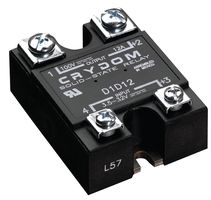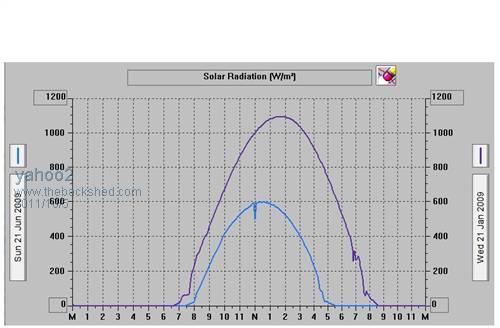
|

|
Forum Index : Solar : Solar array power clipper
| Author | Message | ||||
| yahoo2 Guru Joined: 05/04/2011 Location: AustraliaPosts: 1166 |
With panels getting cheaper, is this the time for a rethink on how us southerners set up our off-grid arrays? The problem as I see it. there is a large difference between the maximum amps output on the charge controller and what we get in May to July at lower latitudes. If I could run charge controllers at 50-90% capacity in winter or basically anytime the energy from the sun is a bit feeble it would make charging an off-grid battery bank so much easier.Here we have a range of available energy from 7800 watts per square metre per day in summer to 2050 watts per square metre per day in winter. I haven't thought this completely through yet so criticism greatly appreciated. I am thinking the new midnite classic has an auxiliary relay trigger from the solar panel voltage reading,. It can switch on at a low voltage and off at a higher voltage. If voltage and amps are directly related I could use a solid state optical relay to add say, two strings of extra panels when the amps drop to 60% capacity and disconnect them at 95% eventually clipping the power. 
this would make stationary panels charge like a solar tracker with more power generated in the morning, while also working like a larger array in winter. Now before someone points out the waste of available power/ panel efficiency, etc, I should mention my reasoning. A top quality LARGE 48 volt battery bank will set you back $14,000+. 7 years use/abuse is $2000 per year (2500 cycles) A genuine deep cycle battery can last for 14 years with good charging technique and temperature control. fast early recharging every day is good technique. that's $1000 per year. Also if I remove the need for a large autostart genset and replace it with a smaller manual generator for emergencies and workshop power there is quite a saving there. Large generators are like boats and trucks they are fueled by money. My Dad used to say if you got rid of a truck or boat (that you are not using) you could throw four $50 notes on the fire every day and still have more money left in your pocket, that was in the 70's too! I think those two savings would pay for the extra panels many times over. Will it work???  don't know, its certainly making my brain cramp up. don't know, its certainly making my brain cramp up.
I'm confused, no wait... maybe I'm not... |
||||
| Tinker Guru Joined: 07/11/2007 Location: AustraliaPosts: 1904 |
Where did you get that info from: "range of available energy from 7800 watts per square metre per day in summer to 2050 watts per square metre per day in winter. "? AFAIK the max power from the sun is around 1000W per square meter of which the best solar panels can harvest around 20%. Maybe I'm not up with the latest on solid state relays but always thought they can only switch AC voltages as they use the zero crossing point to switch. Klaus |
||||
| yahoo2 Guru Joined: 05/04/2011 Location: AustraliaPosts: 1166 |
my mistake its a typo, it should be watt hours per square metre per day (Wh/m2/day). I have a few instruments that have measured and logged solar radiation where I live for a number of years. the figures are cumulative daily energy that hits the ground measured in Langley's and converted to Wh/m2. 1 Ly = 11.622 Wh/m2 I posted the daily average for December 2010 and June 2011 I'm confused, no wait... maybe I'm not... |
||||
Dinosaur Guru Joined: 12/08/2011 Location: AustraliaPosts: 311 |
Hi All Not up with the latest in Solar but reading the posts every day.Looking at adding a solar system to a 28 ft Caravan. Maybe I'm not up with the latest on solid state relays but always thought they can only switch AC voltages as they use the zero crossing point to switch.
SSR's can switch DC, IE: Opto22 DC60MP, switch AC with ZeroCross, and also switch AC with Random turn on. IE:CX240D5R.
I use these to control the AC voltage to vibratory feeders. Regards Regards Hervey Bay Qld. |
||||
| yahoo2 Guru Joined: 05/04/2011 Location: AustraliaPosts: 1166 |
Hi, posting a graph for those of us that love that sort of thing. Its direct comparison of a summers day and winter Watts/m2. 
Its reading about 4% low cos some nasty parrots had gouged the sensor lens. Here is a few numbers 190 Watt panel Peak watts Summer 224W Peak watts winter 116W panel possible daily output Summer 1481Wh Winter 389Wh I reckon these numbers could be reduced by 12-15% for system losses. The batteries will also need approximately 2 hours of afternoon sunshine to complete the absorption phase, this doesn't leave a lot of power to do a bulk charge in June-July. I have some comparisons of the 72 cell panel range from the plodding 165W to the smoking-ly efficient 220W and what combos of strings might give winter charging goodness. I will post them if I find my notebook 
cheers I'm confused, no wait... maybe I'm not... |
||||
| yahoo2 Guru Joined: 05/04/2011 Location: AustraliaPosts: 1166 |
Hi Dinosaur, if you are looking for sound advice on designing a system for motorhomes RV's and caravans, I think one of these books by Collyn Rivers might be really good value. collyns books I haven't read any of the others but "solar success" aimed at home owners is exceptional. I have a few copies that I loan to people that ask me to work on their RE installations. His knack of explaining the ins and outs saves me a lot of time and frustration getting people focused on what they really need. Its spiral ring bound with black and white photos so I assume the others are too. I'm confused, no wait... maybe I'm not... |
||||
Dinosaur Guru Joined: 12/08/2011 Location: AustraliaPosts: 311 |
Hi All Thanks for that yahoo2, will see what book best suits. I have joined the caravanners Forum, and the information there is very good. Even though I am an Electrician with centuries  of Electronic/ Programming experience, this is a completely new field and requires careful study to prevent making mistakes that others have already made. of Electronic/ Programming experience, this is a completely new field and requires careful study to prevent making mistakes that others have already made.
Regards Regards Hervey Bay Qld. |
||||
| daveames Newbie Joined: 19/09/2009 Location: United StatesPosts: 30 |
Hi yahoo2, I can see your reasoning here for some applications. seems some of the controller makers have come to the same conclusion and have given us the wink and nod to go ahead and hang more solar watts on the input and let the controller sort it out on the output leaving any extra solar watts unharvested. here is a snippet from some morningstar documentation: "It is important to note that exceeding the maximum array wattage for a given controller/nominal voltage combination will not damage the controller. Any wattage in excess of the max array wattage will simply be lost. (i.e. Using a 300W array in a system where the max array W is only 200W will not damage the controller, but the 300W array will effectively act like a 200W array and 100W of power will be lost.)" The full document here: http://www.morningstarcorp.com/en/support/library/MS.WP.MPPT vPWM.01.EN.pdf Have you browsed the outback power forum at all? http://www.outbackpower.com/forum/viewforum.php?f=9 Some of the gurus there have been stragically "overloading" these controllers for years with great success for this very reason. I guess it all comes down to your pocketbook..seems in theroy we can hang 1000 watts of solar on the input and choose to harvest 100 watts and leave 900 watts on the table. (only certain MPPT controllers are able to do this) kind regards, dave |
||||
| yahoo2 Guru Joined: 05/04/2011 Location: AustraliaPosts: 1166 |
thanks Dave, I found that morningstar white paper when it was first published and got very exited. I am less confident now, the high voltage, high amp controllers have been almost double the price of the U.S. in Oz until very recently, I am reluctant to kill one if I can avoid it. I see reports of dead controllers on some forums but no detail on how or why and what parts were damaged. I wonder if it is high input voltage reduced to a very low output voltage ( eg 145v to 12.5 v ) that is stressing and breaking them. Guess I will just have to bite the bullet and set up a test system and see for myself. my idea for mark one is to do a 24 volt battery bank with 24 volt panels to the theoretical limit, with the correct rated circuit breakers on each panel, then fit some additional panels with 1 amp or 2 amp circuit breakers. I can switch one or more extra panels into the array and test/observe the components in the controller. mark two would be to wire strings of three panels to get the higher voltage on the same system and see what difference it makes. I notice the manufacturers are reluctant to comment, possibility due to the American National electrical code regulations on DC power switching, which I have to say, does not seem that relevant to off grid solar systems. I'd love to have a crack at the mini inverters like the solaredge system and perhaps feed the batteries with a charger/inverter but that is a little beyond my skill level at the moment. yahoo I'm confused, no wait... maybe I'm not... |
||||